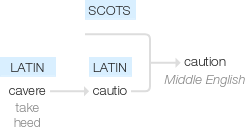Caution
Middle English (denoting bail or a guarantee; now chiefly Scots and US): from Latin cautio(n- ), from cavere ‘take heed’.
wiktionary
Recorded since 1297 as Middle English caucioun(“bail, guarantee, pledge”), from Old French caution(“security, surety”), itself from Latin cautiō, from cautus, past participle of caveō, cavēre(“be on one's guard”).
etymonline
caution (n.)
c. 1300, caucioun, "bail, guarantee, pledge," from Old French caution "security, surety" (13c.), from Latin cautionem (nominative cautio) "caution, care, foresight, precaution," noun of action from past participle stem of cavere "to be on one's guard" (from PIE root *keu- "to see, observe, perceive").
The Latin sense re-emerged in English as "prudence in regard to danger" (1650s). Meaning "word of warning, monitory advice" is from c. 1600. Meaning "anything which excites alarm or astonishment" is U.S. slang, 1835.
caution (v.)
"to warn, exhort to take heed," 1640s, from caution (n.). Related: Cautioned; cautioning.
